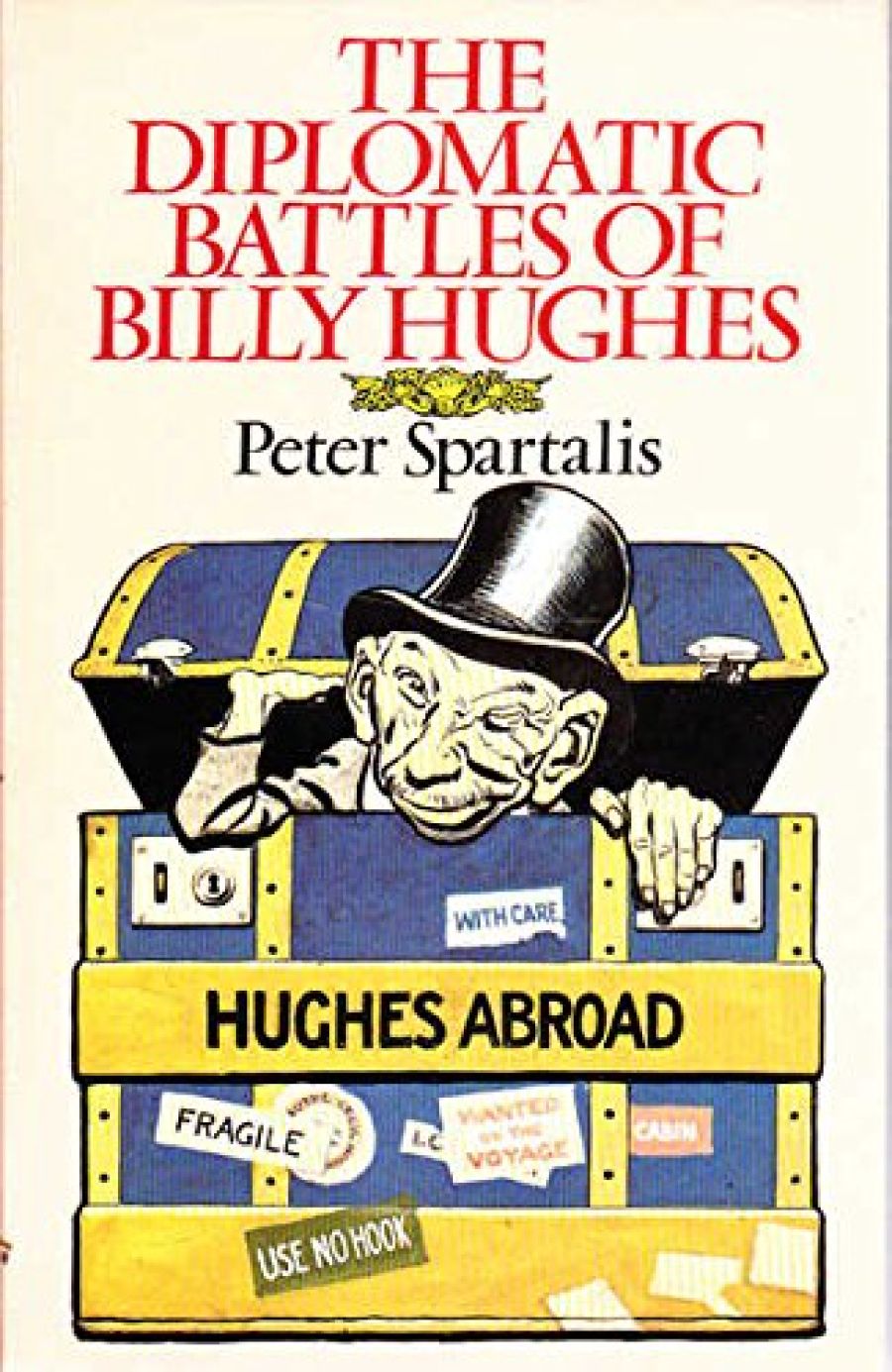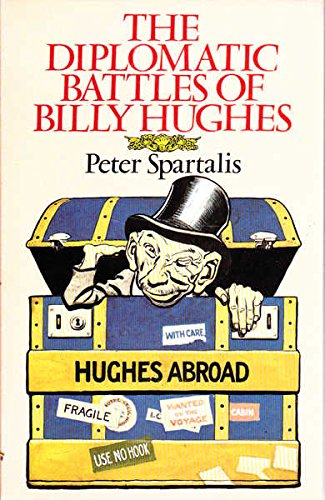
- Free Article: No
- Contents Category: Politics
- Review Article: Yes
- Article Title: Hardline Billy
- Online Only: No
- Custom Highlight Text:
Billy Hughes, Prime Minister of Australia from 1915 to 1923, had that same acerbic larrikin quality in his dealings with enemies at home and abroad that has become familiar to us in our current elected leader. Yet Hughes never forsook the heedless and stubborn directness that seems to have deserted Bob Hawke in recent and more sober times. Peter Spartalis’s book is about Hughes’s colourful and dynamic international role and achievements as Prime Minister and about the many protracted battles he fought in what he believed to be Australia’s diplomatic interests though there was nothing at all diplomatic about his style.
- Book 1 Title: The Diplomatic Battles of Billy Hughes
- Book 1 Biblio: Hale & Iremonger, 309pp. biblio., index, $27.95, $14.95pb 0 86806 084 4, 0 86806 085 2 pb
- Book 1 Cover Small (400 x 600):

- Book 1 Cover (800 x 1200):

In disentangling Hughes’s endeavours in foreign affairs from his domestic political activities, Spartalis has made a valiant if not always successful attempt to show both a personal consistency and representative national themes emerging. However, I have two serious reservations about the value of the work as a contribution to historical understanding either of Hughes or Australia’s early external policies. First, most of the material has been examined in detail and many of the documents quoted before in the second volume of L.F. Fitzhardinge’s mammoth biography of William Morris Hughes published in 1979. Second, in defending the view that Hughes’s career represents the first emergence of a ‘proto foreign policy’ for Australia, Spartalis allows himself to become too much his subject’s apologist. Unfortunately, then, the work lacks not only the originality but also the more critical and elegant acuity of Fitzhardinge’s not unsympathetic treatment.
There is an important exception. Spartalis’s penultimate chapter on Australia’s brutal post-war policy in the former German colony of New Guinea is a tantalisingly brief demonstration in microcosm of the ethnocentric core of Australian foreign policy and its ‘search for security in the Pacific’. As he describes it, a royal commission was set up into the future of ‘late German New Guinea’ in 1919 even before the ‘C’ class mandate was officially granted to Australia by the League of Nations. It did not represent a balance of views. In the conflict between Hubert Murray, the Administrator of Papua, and W.H. Lucas, representing the shipping firm, Bums, Philp & Co., humanitarianism and native welfare lost and were cynically sacrificed to commercial advantage. On the question of the rights of hard-working German residents and missionaries, the same ruthless expediency prevailed, the commissioners desperately and fruitlessly looking for examples of German brutality to the natives to justify their recommendations. The result was the thorough-going expropriation of land owned by Germans–Spartalis includes a fascinating appendix of appeals to the special magistrate – and the cynical assignment of responsibility for their compensation to the German government. Hughes, Spartalis acknowledges in one of his rare criticisms, saw this as partial recompense for his failure to gain the reparations he had sought at Versailles. It was, however, quite consistent with the case he had argued at the Paris economic conference in 1916 which sought permanently to exclude Germany from any major role in world trade after the war.
Hughes also appeared as a hard-liner at the peace conference that ended the Great War. His uncompromising position on three questions in which he took special interest – reparations, mandates and racial equality – confirms this. His attitude to the League of Nations and President Wilson, at times just sceptical, at others, downright hostile, was even more illuminating; here one discerns an ideological basis to Hughes’s general position on international relations not fully acknowledged or elaborated in this book.
Spartalis draws out Hughes’s pre-war attitudes to defence and foreign relations, justly emphasising his dual commitment to Australia and the British Empire, and also his belief in military preparedness through a compulsory citizen army. His constant agitation for greater consultation in Imperial affairs is also stressed. Yet it is insufficient to explain it alias a product of a “severely realistic view of affairs”, just as many have inadequately labelled the Labor Party’s platform “socialism without doctrines”. It is possible, after all, to be realistic or pragmatic from different political perspectives and hence to have several realistic solutions to any given problem. Other analysts have distinguished a variety of approaches to nation, empire and international relations that stemmed from different political philosophies but were also tied to geographic realism. The use of a nomenclature that describes such points of view as, for example, authoritarian, moderate, radical or revolutionary, is a considerable aid to the vexed question of the meaning of pre-war and wartime nationalism in Australia. Spartalis’s assessments tend rather to be utilitarian; Hughes was, after all, right, he tells us – right about Japan, right about the League, right about Germany’s capacity to pay. ‘Right’ in these limited terms, it seems to me, represents merely the closing of a circular argument from which many of the alternative suggestions for the peace had been excluded on ideological grounds.
Hughes’s opinions on international and imperial affairs were close to authoritarian, eschewing international arbitration, glorifying imperial power and expansion, advocating an essentially mercantilist view of trade and economics, and usually associated with political conservatism rather than with the radical politics he claimed to espouse domestically. The apparent contradiction may go a long way to explaining the comparative ease with which he was able to become leader of an essentially conservative Nationalist Party after being expelled from the Labor Party at the end of 1916.
Hughes’s overriding commitment to the imperial connection included a dedication to evolving a more workable system for the government of Britain’s ‘far-flung battle lines’ of empire. This is the major theme of Spartalis’s argument for Hughes as the principal architect of a ‘proto-foreign policy’ for Australia. Certainly he gave it much thought as did Smuts of South Africa and Borden of Canada and it is clear that he rejected the romantic and elaborate schemes of Imperial Federation still being aired round the Colonial Office. Yet there were some inconsistencies in Hughes’s position and a lack of the vision that distinguished Smuts. While he fought for independent representation and detailed consultation at Paris in 1916 and Versailles in 1919 and protested bitterly about the failure to consult during the Chanak Crisis of 1922, he was “profoundly disturbed” by the adoption of the Balfour Declaration at the Imperial Conference of 1926 which established a more egalitarian British Commonwealth. Although this goes beyond Spartalis’s time-span, a discussion of Hughes’s reasons, set out in his book The Splendid Adventure, would have tied up the loose ends of the argument in The Diplomatic Battles of Billy Hughes.
As a populist, Hughes sometimes succumbed to the prejudices of his audiences and was thus able to depict himself as the prisoner of the racial prejudices of the Australian electorate in order to justify his determined and uncompromising stand against the Japanese delegation’s attempt to insert a racial equality clause in the League of Nations charter. Spartalis agrees with Hughes’s judgement that this was politically impossible for Australian delegates to accept whatever their personal feelings. He sympathises, too, with the Prime Minister’s belief that his opposition was used as a shield by the Americans to conceal their own misgivings about the clause. There is enough evidence of ambivalence in the diaries of some members of the U.S. delegation and of anxiety among the Japanese to reach a compromise before hardliners at home exerted more influence, to cast some doubt on the judgement that the problem was intractable. But this is a matter for individual interpretation and does not detract from the usefulness of the chapter devoted to the intricate negotiations on the question.
As a text for college and university students, Spartalis’s work is a concise and careful analysis of the role of a dominating figure in some of the major arguments and steps in Australia’s early foreign policy, despite the absence of an ideological context. The frequent and lengthy quotations from sources only available here and in Fitzhardinge will be greatly appreciated.


Comments powered by CComment